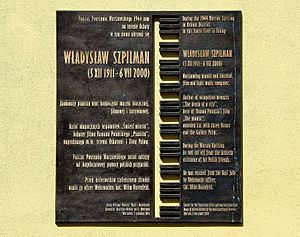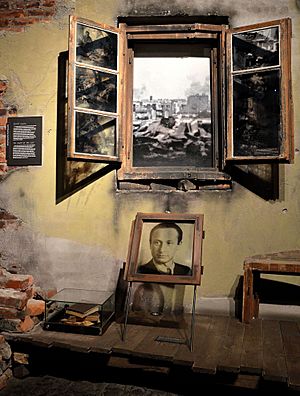Władysław Szpilman facts for kids
Quick facts for kids
Władysław Szpilman
|
|
|---|---|
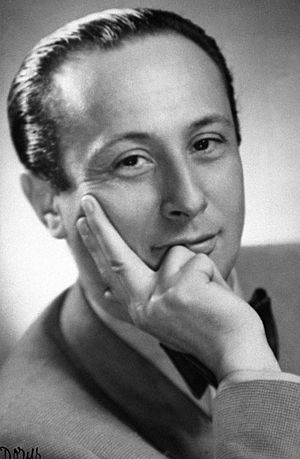 |
|
| Born | 5 December 1911 Sosnowiec, Congress Poland, Russian Empire
|
| Died | 6 July 2000 (aged 88) |
| Resting place | Powązki Military Cemetery, Warsaw |
| Nationality | Polish |
| Occupation | Composer, pianist, author |
| Years active | 1930–2000 |
| Spouse(s) |
Halina Grzecznarowska Szpilman
(m. 1950) |
| Children | 2, including Andrzej Szpilman |
Władysław Szpilman (born December 5, 1911 – died July 6, 2000) was a famous Polish pianist and composer. He was of Jewish background. Szpilman is best known because his true story was told in the 2002 movie The Pianist.
The movie was based on Szpilman's own book. It showed how he survived the German occupation of Warsaw during World War II and the terrible events of the Holocaust.
Szpilman studied piano in Berlin and Warsaw. He became a popular musician on Polish radio and in concerts. When Germany invaded Poland, Szpilman and his family were forced to live in the Warsaw Ghetto. He spent two years hiding from the German soldiers. Towards the end of the war, a German officer named Wilm Hosenfeld helped him. This officer did not agree with the Nazi government's cruel actions. After World War II ended, Szpilman continued his music career on Polish radio. He also wrote many songs and orchestral pieces.
Contents
Becoming a Pianist
Władysław Szpilman started learning piano at the Chopin Academy of Music in Warsaw, Poland. He learned from great teachers. In 1931, he went to study at a famous art academy in Berlin, Germany.
After Adolf Hitler became Germany's leader in 1933, Szpilman returned to Warsaw. He quickly became a well-known pianist and composer. He played classical music and popular songs. He often performed alone, but also played with famous violinists. In 1934, he toured Poland with a U.S. violinist named Bronislav Gimpel.
On April 5, 1935, Szpilman started working for Polish Radio. He played classical music and jazz. He also wrote music for films and about 50 popular songs. When Germany invaded Poland in September 1939, Szpilman was a star on Polish Radio. The radio station was bombed on September 23, 1939. This happened shortly after Szpilman finished playing a Chopin piano piece.
The German occupiers created special areas called ghettos in many Polish cities. These were places where Jewish people were forced to live. Szpilman and his family already lived in the area that became the Warsaw Ghetto.
Surviving the Holocaust
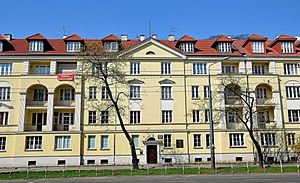
Władysław Szpilman and his family, like all other Jewish people in Warsaw, were forced into the Warsaw Ghetto on October 31, 1940. A high wall was built to separate the ghetto from the rest of the city. Szpilman found work as a musician to support his family. This included his mother, father, brother Henryk, and two sisters, Regina and Halina. He played in several cafes inside the ghetto.
In 1942, his entire family was sent to Treblinka. This was a death camp in German-occupied Poland, about 80.5 kilometers (50 miles) northeast of Warsaw. A member of the Jewish Police, who knew Szpilman, pulled him out of the line. His parents, brother, and sisters were loaded onto a train, and none of them survived the war.
Szpilman stayed in the ghetto as a worker. He also helped to secretly bring in weapons for the Jewish resistance. He remained in the Warsaw Ghetto until February 13, 1943. The ghetto was destroyed shortly after, in April–May 1943.
Szpilman found places to hide in Warsaw. His friends from Polish Radio and other musicians helped him survive. He avoided being caught many times. From August 1944, Szpilman hid in an empty building. In November, a German officer, Captain Wilm Hosenfeld, found him there. Szpilman was surprised when the officer did not arrest him. After learning Szpilman was a pianist, Hosenfeld asked him to play. Szpilman, very weak, played Chopin's Nocturne No. 20 in C♯ minor.
After that, the officer brought him food many times. He also gave Szpilman his coat to keep warm. Szpilman did not know the German officer's name until 1951. Even though Szpilman and others tried to help him, Hosenfeld died in a Soviet prisoner of war camp in 1952.
Return to Polish Radio
Szpilman started working for Polish Radio in 1935. On September 23, 1939, he was playing live when German forces attacked the studio. He had to stop playing. This was the last live music broadcast heard until the war ended.
When Szpilman returned to Polish Radio in 1945, he picked up exactly where he left off. He opened the first broadcast by playing Chopin's Nocturne in C-sharp Minor again.
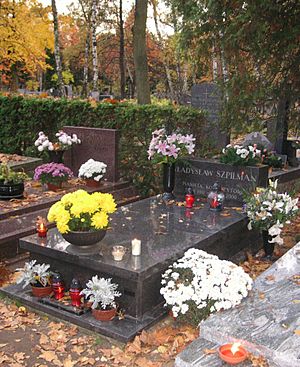
From 1945 to 1963, Szpilman was in charge of the Popular Music Department at Polish Radio. He also performed as a concert pianist in Poland and around the world. During this time, he wrote many symphonic works and about 500 other pieces. Many of these are still popular in Poland today. He also wrote music for radio plays and films. In 1961, he started the International Song Contest in Sopot, Poland. This contest has happened every summer for over 50 years.
In 1963, Szpilman and Bronislav Gimpel started the Warsaw Piano Quintet. Szpilman played more than 2000 concerts with this group worldwide until 1986. They performed in famous halls in London, Paris, and Munich.
Szpilman's Music
Even when he was living in the Warsaw Ghetto, Szpilman never stopped wanting to write music. His works include pieces for orchestra, concertos, and piano solos. He also wrote a lot of music for radio plays and films. He composed about 500 songs, and over 100 of them became very popular hits in Poland. In the 1950s, he wrote about 40 songs for children. For these, he received an award in 1955.
His son, Andrzej Szpilman, said in 1998 that his father's music was not well known outside Poland. He thought this was because Europe was divided into two parts after the war. His father "shaped the Polish popular music scene over several decades," but music from Eastern Europe did not easily reach Western countries.
Some of Szpilman's compositions include "Life of the Machines" (a piano suite from 1932), a Violin Concerto (1933), and "Waltzer in the Olden Style" (1937). He also wrote music for films like Wrzos (1938) and Doctor Murek (1939). His works are now published by music companies in New York, Berlin, and London.
The Book: The Pianist
Szpilman's book, The Death of a City, was written shortly after the war ended. It was first printed in 1946. However, the book was changed by the government at the time for political reasons. For example, the kind German officer, Wilm Hosenfeld, was described as Austrian instead of German. This was because it was hard to publish a book in Poland right after the war that showed a German officer as a good person.
In 1998, Szpilman's son, Andrzej, published a new, longer version of his father's story. It was first released in German and then in English as The Pianist. In March 1999, Władysław Szpilman visited London to celebrate the book's release in Great Britain.
The book became very popular and was published in over 35 languages. It was named "Best book of the year" by many newspapers and magazines. It also won several awards. The new Polish edition became a bestseller for three years.
Many people praised Szpilman's book. One newspaper called it "a compelling, harrowing masterpiece." It was described as "one of the most powerful accounts ever written" about that time. The book's description of the famous teacher and writer Janusz Korczak was called "overwhelmingly powerful and poignant."
The 1999 English version of the book also includes parts of Wilm Hosenfeld's diary. This gives more information about Hosenfeld's actions. He helped several other people in Warsaw. Sadly, Hosenfeld died in a Soviet prison camp in 1952, even though Szpilman tried to help him.
Szpilman's book ends with his survival, but it does not have a happy ending. In the last paragraphs, he walks through the ruined city of Warsaw. He describes the wind blowing through the destroyed buildings and snow falling from the dark sky. This ending shows the book's powerful and moving style.
Film Adaptation
In 2002, the Polish-French filmmaker Roman Polanski directed a movie based on the book. The movie, also called The Pianist, won three Academy Awards (Oscars) in 2003. These were for best director, best actor, and best adapted screenplay. It also won the Best Film Award and the Palme d'Or at the Cannes Film Festival.
Roman Polanski himself survived the Nazi period, but his mother was killed by the German occupiers. Polanski's film closely follows the book's story and details. When Adrien Brody accepted his Oscar for Best Actor, he said that the film would not have been possible without Władysław Szpilman's story. He called it "a tribute to his survival."
Szpilman's son, Andrzej Szpilman, put together a CD of his father's most popular songs. Other CDs with Szpilman's music include "Works for Piano and Orchestra" and "Original recordings of The Pianist." In November 1998, the president of Poland honored Szpilman with a special award.
Death and Tributes
Władysław Szpilman died peacefully in Warsaw on July 6, 2000, at the age of 88. He is buried at Powązki Military Cemetery. On September 25, 2011, Polish Radio's Studio 1 was named after Władysław Szpilman.
On December 4, 2011, a special plaque was put up at 223 Niepodległości Avenue in Warsaw. It was engraved in Polish and English to remember Szpilman. His wife, Halina Szpilman, and son, Andrzej, were there, along with Wilm Hosenfeld's daughter. The next day, on Szpilman's 100th birthday, the Polish President met with Szpilman's family and Hosenfeld's daughter.
Uri Caine, an American pianist and composer, has created his own versions of Szpilman's music. A CD of Caine's concert was released in 2014.
Images for kids
-
House at al. Niepodległości 223 in Warsaw where in 1944 Szpilman met Wilm Hosenfeld
-
Władysław Szpilman's grave in Powązki Military Cemetery in Warsaw
See also
 In Spanish: Władysław Szpilman para niños
In Spanish: Władysław Szpilman para niños
- 9973 Szpilman (main belt asteroid)
- Andrzej Bogucki
 | William Lucy |
 | Charles Hayes |
 | Cleveland Robinson |


